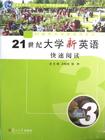21世纪大学新英语系列·普通高等教育十一五国家级规划教材
2012-6
复旦大学出版社
汪榕培,邹申 编
148
无
在互联网高速发展的信息时代,我们需要阅读的英语资料浩如烟海,仅靠延长阅读时间来获取知识和信息的办法显然已不能适应时代发展的要求。因此,增加大学英语快速阅读教学,培养和训练学生的快速阅读能力,就成为大学英语教学中不容忽视的一项重要内容。 根据2007年国家教育部高教司颁布的《大学英语课程教学要求》(以下简称《课程要求》),大学英语的教学目标是培养学生的英语综合应用能力。而阅读作为一项基本技能,始终是英语综合能力训练中的一个重要环节。从一定意义上讲,阅读速度又是衡量阅读能力的重要指标之一。 《课程要求》提出了三个层次的英语教学要求,其中的“一般要求”和“较高要求”均对快速阅读能力作了详细说明。快速阅读的一般要求是能够应对篇幅较长、难度略低的材料,阅读速度应达到每分钟100词,并能就阅读材料进行略读(skirrrning)和寻读(scanning);而较高要求是要能够应对篇幅较长、难度适中的材料,并且阅读速度达到每分钟120词。而且两个要求均提出学生通过阅读能够掌握中心大意,理解主要事实和有关细节。由此可见,深化快速阅读教学,进一步提高阅读能力,仍是培养和提高大学生语言运用能力的关键所在。 本系列教材是以《大学英语课程教学要求》为准则,在参考国内外多种英语快速阅读教材的基础上,根据编者多年从事大学英语快速阅读教学的经验,以及我国非英语专业本科生目前整体英语水平和实际英语能力编写而成。 教材共分六册,旨在帮助学生进行系统的、有针对性的快速阅读训练,掌握基本阅读技能,培养良好阅读习惯,提高阅读效率。选材方面,我们力求所选文章兼备时代性、信息性、趣味性以及可读性,语言难度适中,其体裁和题材体现多样性,话题涵盖中西文化、教育、生活、媒介、历史、科技、哲学、文学等。练习方面,我们主要以现行大学英语四六级考试中快速阅读题型为主,又适当增加其他形式的题型:既有选择填空、对错判断和填空等基本题型,又有匹配、简短回答、摘要以及翻译等练习。目的是使学生在学习完本套教材后提高快速阅读部分的应试能力,同时又增强他们的信息搜索能力。每册书后附有本册练习的参考答案供师生参考。 本书共分八个单元,每个单元由Passage A、Passage B和Passage C三篇文章组成。Passage A和Passage B供课堂使用,Passage C供学生课外阅读。 同时,为了提高学生的快速阅读能力和应对四六级机考,本系列教材还配有助学光盘。光盘中还增加了文化背景知识、难词和短语的注解以及答案解析等内容,以方便教师和学生配套使用。 本套教材的编者分别来自复旦大学、上海外国语大学、上海第二军医大学、北京师范大学、苏州大学、哈尔滨学院以及解放军外国语大学等院校。由于编者水平有限,书中错误及疏漏之处在所难免,敬请广大读者批评指正。
《21世纪大学新英语系列:21世纪大学新英语·快速阅读(3)》是以《大学英语课程教学要求》为准则,在参考国内外多种英语快速阅读教材的基础上,根据编者多年从事大学英语快速阅读教学的经验,以及我国非英语专业本科生目前整体英语水平和实际英语能力编写而成。 教材共分六册,旨在帮助学生进行系统的、有针对性的快速阅读训练,掌握基本阅读技能,培养良好阅读习惯,提高阅读效率。选材方面,我们力求所选文章兼备时代性、信息性、趣味性以及可读性,语言难度适中,其体裁和题材体现多样性,话题涵盖中西文化、教育、生活、媒介、历史、科技、哲学、文学等。练习方面,我们主要以现行大学英语四六级考试中快速阅读题型为主,又适当增加其他形式的题型:既有选择填空、对错判断和填空等基本题型,又有匹配、简短回答、摘要以及翻译等练习。目的是使学生在学习完本套教材后提高快速阅读部分的应试能力,同时又增强他们的信息搜索能力。每册书后附有本册练习的参考答案供师生参考。 《21世纪大学新英语系列:21世纪大学新英语·快速阅读(3)》共分八个单元,每个单元由Passage A、Passage B和Passage C三篇文章组成。Passage A和Passage B供课堂使用,Passage C供学生课外阅读。 同时,为了提高学生的快速阅读能力和应对四六级机考,《21世纪大学新英语系列:21世纪大学新英语·快速阅读(3)》还配有助学光盘。光盘中还增加了文化背景知识、难词和短语的注解以及答案解析等内容,以方便教师和学生配套使用。
Unit 1 TEACHING AND LEARNINGPassage 1 “See Spot Run”:Teaching My Grandmother to ReadPassage 2 Learning Cultural Differences in Nonverbal CommunicationsPassage 3 15 Steps to Cultivate Lifelong LearningUnit 2 HELPING PEOPLE IN NEEDPassage 1 Finding a Good Volunteer OpportunityPassage 2 A Joyful Philanthropist (慈善家)Passage 3 The Overview of the Debate over Euthanasia (安乐死)Unit 3 FRIENDSHIPPassage 1 Friendship from the AnimalsPassage 2 Is True Friendship Dying Away?Passage 3 Importance of Friendship in Childhood and Adolescence(青春期)Unit 4 HOBBIESPassage 1 FDR’s Stamp Collection:A Childhood Hobby He Took to the Oval OfficePassage 2 Music in My FamilyPassage 3 Pet Owner to Pet Trainer - Transforming Your Pastime into a ProfessionUnit 5 FAMOUS PEOPLEPassage 1 Movie Stars Aren’t Happy - The Public Struggles of Celebrity Perfomers Can Lead to MiseryPassage 2 The Inspirational Story of Steve JobsPassage 3 How to Overcome or Stop Celebrity WorshipUnit 6 SUCCESSPassage 1 Is Education the Kcy to SuccessPassage 2 Charactcr and SucccssPassage 3 Honcsty iii SuccessUnit 7 HONESTYPassage 1 Lies Are Never a Part of Your Own TruthPassage 2 How to Tell If Someone Is Lying to You?Passage 3 Analysis of Ethics:Is Honesty the Best Policy?Unit 8 ENVIRONMENTPassage 1 Celcbrating Earth Day——Celcbrating Forty Years of Grassroots Efforts of Saving Our EarthPassage 2 Walking and the EnvironmcntPassage 3 Rcflcctions:Saving the EnvironmcntAppendixKeys and Answers
1.When I was 14 years old and very impressed with my teenage status, I set for myself a very special goal - that made me so different from my friends that I don t believe I told a single one. As a teenager, I was expeaed to bave deep, dark secrets, but I was not supposed to keep them from my friends. 2.My secret was a project that I undertook every day after school for several months. It began when I stealthily (暗地里) made my way into the local elementary school-hon:or of horrors should I be seen; I was now in junior high. I identified myself as a graduate of the elementary school, and being taken under way by a favorite fifth grade teacher, I was g:iven a small bundle from a locked storeroom - a bundle that I quickly dropped into a bag,lest anyone see me walking home with something from the "little kids" school. 3.I brought the bundle home - proudly now, for within the confines of my home, I was proud of my ptoject. I walked into the living room, and one by one, emptied the bag of basic feading books. They were tbin books with colorful covers and large print. The words were monosyllabic and repetitive. I sat down to the secret task at hand. 4."All right",I said authoritatively'to my 70-yeat-old grandmother, "today we begin our first reading lesson". 5.For weeks afterward, my grandmother and I sat patiendy side by side - roles reversed as she, with a bit of difficulty, sounded out every word, then read them again, piece by piece, until she understood the short sentences. When she slowly repeated the full sentence, we both would smile and clap our hands - I felt so proud, so grown up. 6.My grandmother was born in Kalamata, Greece, in a rocky little farming village where nothing much grew. She never had the time to go to school. As the oldest child she was expected to take care of her brother and sister, as well as the house, and her father scratched out what little he could from the soil. 7.So, for my grandmother, schooling was out. But she had big plans for herself. She had heard about America. About how rich you could be. How people on the streets would offer you a dollar just to smell the flower you were carrying. About how everyone lived in nice houses - not stone huts on the sides of mountains - and had nice clothes and time for school. 8.So my grandmother made a decision at 14 - just a child, I realize now - to take a long and sickening 30-day sea voyage alone to the United States. After lying about her age to the passport offiaals, who would shake their heads firmly at anyone under 16 leaving her family, and after gving her favorite gold earrings to her cousin, saying "In America, I will have all the gold I want", my young grandmother put herself on a ship. She landed in New York in 1916. 9.No need to repeat the story of how it went for years. The streets were not made of gold. People weren’t interested in smelling flowers held by strangers. My grandmother was a foreigner. Alone. A young gid who worked hard doing piecewotk to eam enough money for meals. No leisure time, no new gold earrings - and no school. 10.She leamed only enough English to help her in her daily business as she traveled about Brooklyn Socially, the "foreigners" stayed in neighborhoods where they didn t feel like foreigpers. English came slowly. 11.My grandmother had never leamed to read. She could make out a menu, but not a newspaper. She could read a street sign, but not a shop directory. She could read only what she needed to read as, throug the yeats, she married, had five daughters, and helped my grandfather with his restaurant. 12.So when I was 14-the same age that my grandmother was when she left her family, her country, and everything she knew - I took it upon myself to teach my grandmother something, something I already knew how to do. Something with which I could gjve back to her some of the things she had taught me. ……

无
21世纪大学新英语系列·普通高等教育十一五国家级规划教材 PDF格式下载